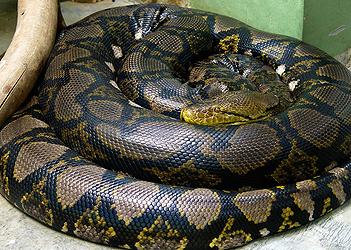
TAMPA, Florida, July 26, 2019 (ENS) – An indictment from a federal grand jury sitting in Tampa was unsealed Wednesday, charging Novita Indah, 48, and Larry Malugin, 51, of Port Richey, Florida, with conspiracy and trafficking in protected wildlife. The indictment charges the couple with smuggling wildlife from Indonesia to the United States and reselling the wildlife from their Florida home.
The U.S. Fish and Wildlife Service seized 369 wildlife articles from their home during the execution of search warrant on January 12, 2017.

The agents recovered assorted Javan spitting cobra, reticulated python, and monitor lizard mounts, belts, and wallets, as well as the skull of a babirusa, a rare Indonesian pig valued for its distinctive curving tusks.
The indictment alleges that beginning in 2011, Indah and Malugin sold wildlife on eBay from their Indonesian home to buyers across the world. They would smuggle the items to purchasers in the United States in packages falsely labeled to conceal their contents.
Indah and Malugin continued to sell wildlife after they moved to Puerto Rico and then moved to Florida in 2013. All of the wildlife was protected by an international treaty, the Convention on International Trade in Endangered Species, CITES.
The United States, Indonesia, and 181 other countries are signatories to CITES, which regulates international trade in species whose continued survival is threatened by trade.
In addition to the seized wildlife items, Indah and Malugin also trafficked in taxidermy mounts and bones of leopard cats, owls, and Southeast Asian primates, including slow loris, macaques, lutungs, and langurs.
“The CITES agreement was created to prevent the international trade of protected wildlife, and the Department of Justice will seek to prosecute individuals who flout this treaty and other important environmental laws,” said Assistant Attorney General Jeffrey Bossert Clark for the Justice Department’s Environment and Natural Resources Division.
“The Department commends the actions taken by the U.S. Fish and Wildlife Service and will continue to work with our law enforcement partners to combat illegal wildlife trafficking.”
“The U.S. Fish and Wildlife Service Office of Law Enforcement is committed to combating wildlife trafficking and protecting imperiled species at home and abroad,” said Edward Grace, assistant director of the U.S. Fish and Wildlife Service Office of Law Enforcement.

“The increased use of the internet has opened a growing pathway for the illegal wildlife trade and wildlife traffickers go to great lengths to smuggle reptiles, birds, primates, and other species in and out of the U.S. The Service would like to thank the U.S. Department of Justice for their assistance with this case. Together, we can combat wildlife trafficking and protect species across the world,” said Grace.
From 2011 to 2017, Indah and Malugin made some 4,596 online sales of CITES-protected wildlife worth about $211,212.
The U.S. Fish and Wildlife Service and U.S. Customs inspectors repeatedly seized packages shipped by Indah and Malugin, but they continued to sell wildlife using various eBay and PayPal accounts.
This investigation was part of Operation Global Reach, a U.S. Fish and Wildlife Service long-term taskforce into the flow of illegal wildlife from Indonesia to the United States.
If convicted, Indah and Malugin face a maximum sentence of 20 years incarceration on the smuggling charges and five years for Lacey Act violations. The indictment also seeks to forfeit the wildlife seized from their residence.
An indictment is merely an allegation, and the defendants are presumed innocent until proven guilty beyond a reasonable doubt in a court of law.
The U.S. Fish and Wildlife Service Office of Law Enforcement in Redmond, Washington led the investigation, with assistance from agents in Tampa. The U.S. Government is represented by trial attorneys Ryan Connors and Matthew Evans of the Environmental Crimes Section.
Copyright Environment News Service (ENS) 2019. All rights reserved.
© 2019, Environment News Service. All rights reserved. Content may be quoted only with proper attribution and a direct link to the original article. Full reproduction is prohibited.
